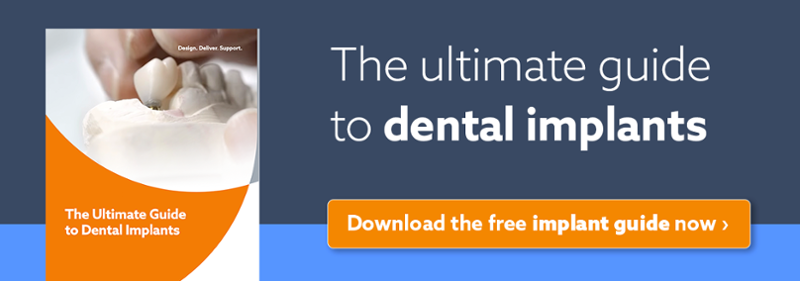Dental implants are becoming the preferred treatment for restoring missing teeth, replacing a more traditional option: tooth-supported bridges. There are advantages and disadvantages to both treatments, and dentists need to consider all the various factors and discuss this with their patients.
Dental implants artificially replace a tooth root, but unlike a real tooth root, the post of the implant actually fuses with the surrounding bone. Once an abutment and a crown are attached, it becomes a standalone tooth, closely replicating a real tooth in functionality and appearance. For this reason, dental implants are especially popular when only a single tooth is missing. There must be sufficient support, with a high quantity and quality of bone, for dental implants to be successful. If the bone is insufficient, it can usually be restored with a bone graft prior to implant surgery.
In contrast, a tooth-supported bridge is retained by natural teeth adjacent to the gap, called abutment teeth. To replace a single missing tooth, abutment teeth must be prepared to receive dental crowns to which a pontic or false tooth is attached. The complete restoration is then cemented onto the abutment teeth, creating a three-tooth or three-unit bridge. For a tooth-supported bridge to be successful, these abutment teeth must be relatively strong and able to withstand the additional stress of supporting a replacement tooth. Treatment is not suitable if these abutment teeth are too weak or are missing completely.

Advantages of Choosing Dental Implants
Well-planned dental implant treatments can provide highly esthetic and fully functional replacement teeth where results are predictable and reliable. One huge advantage of choosing dental implants is that the abutment teeth are not affected. Another important consideration is the implant’s effect on the surrounding bone. By replicating a natural tooth root, jawbone loss is prevented and the bone remains healthy and strong. Unlike a tooth-supported bridge, a dental implant cannot decay. Over time, a single implant supported tooth can prove to be more cost-effective than a three-unit bridge, provided it is properly cared for.
Disadvantages of Choosing Dental Implants
Treatment is initially more expensive and takes longer to complete than a tooth supported bridge. Minor surgery is required which can deter some patients. Once the implant is placed, it generally needs several months to heal and bond with the bone before a permanent tooth replacement can be fitted.
Advantages of Dental Bridges
A properly-made dental bridge is designed to be fully functional while producing excellent esthetic results. It is a predictable and reliable treatment that is initially less expensive than dental implants. Treatment can be completed more quickly, generally within just a few weeks.
Disadvantages of Dental Bridges
The main disadvantage of a dental bridge is that abutment teeth must be reshaped and it’s often necessary to remove significant amounts of healthy tooth material to create room for the supporting crowns. Removing healthy tooth material increases the risk of decay developing underneath the crowns. All restorations need replacing periodically, and replacing a three-unit bridge is likely to be more expensive than replacing a single-implant crown. Some patients may find it tricky to thoroughly clean around the pontic, whereas an implant crown can be brushed and flossed just like a normal tooth.
For many people, the cost will be an important factor, as will the small surgery that is needed to place the implant. However, many clinicians use computer guided surgery, providing patients with a quicker, smoother, more successful, and more accurate treatment. The long-term success rates for dental implants are high and patient satisfaction can be greater, as the esthetic appearance of single-implant crowns can be extremely pleasing.
Please be reminded that should you wish to discuss a case in more detail, our experienced technical team is here to assist you.
Click here to schedule a consultation with our technical team »
